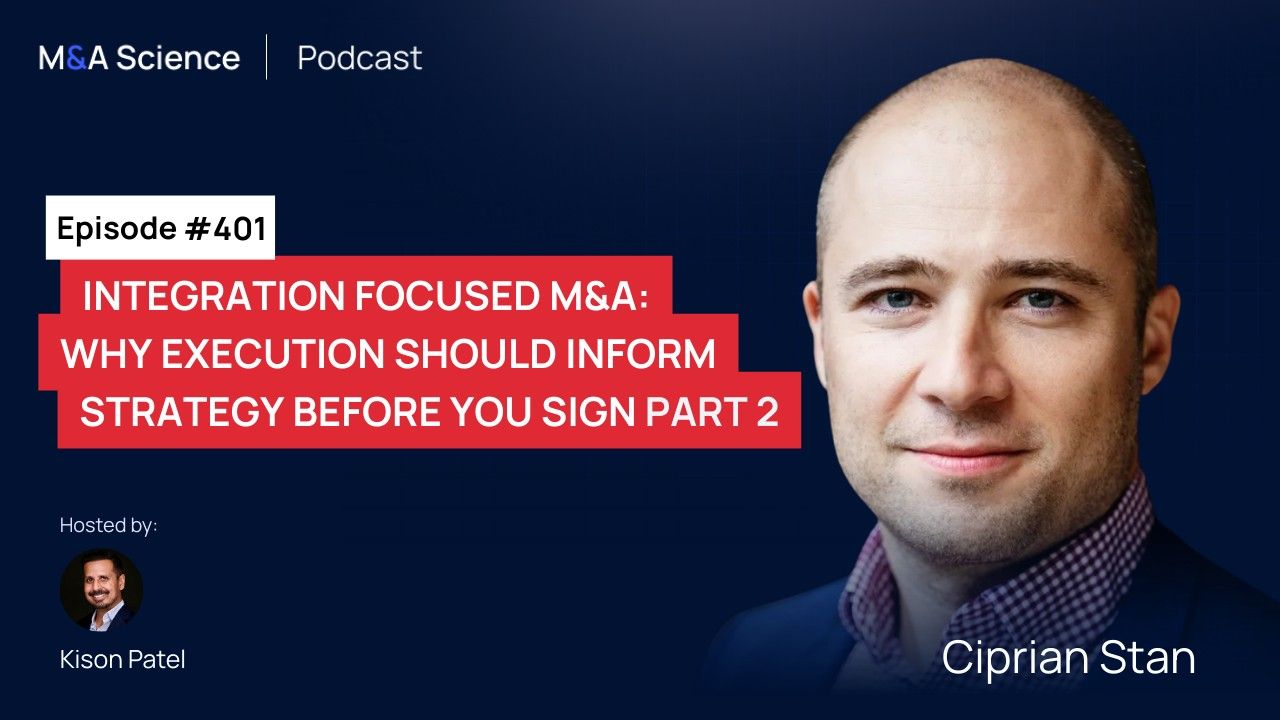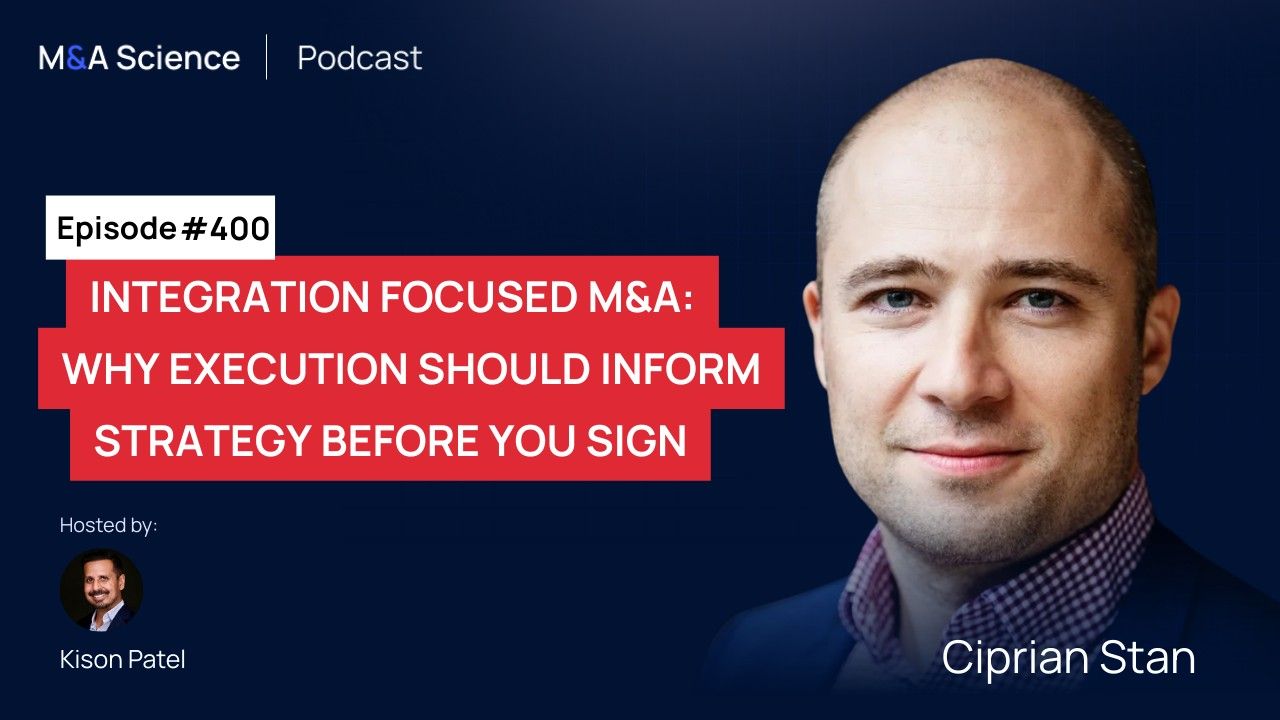_Easy-Resize.com_Easy-Resize.com.webp)
Willy Walker
Episode Transcript
Growing the company through M&A
When I joined, we didn't have a brand; we didn't have capital so, it was really hard.
The first couple of years were really growing organically, building a brand, and getting the team really focused on growth.
We had fantastic growth characteristics at the beginning, then when the great financial crisis hit; several big Wall Street firms were exiting.
We were fortunate that we approached Credit Suisse, and they had a company called Column Guarantee, their commercial mortgage finance group, which they lent with Fannie, Freddie, and HUD.
And we were keenly interested in the Fannie, Freddie, and HUD businesses because the government guaranteed they could continue to operate throughout the great financial crisis.
We put a deal together where Credit Suisse took all stock and Walker & Dunlop. We didn't have to use a dollar of our own money, but they took a 35% interest in Walker & Dunlop in exchange for selling us Column. That was the first deal that we did. Since then, I've been doing deals my whole life.
The first deals
In the Credit Suisse deal, we didn't do TSA. All we were buying was the servicing portfolio and the bankers who were at the platform and didn't have a new home. So we picked up a lot of origination talent, and then we picked up the servicing portfolio. We were 70 people, and we added 35 but it wasn't that big.
The acquisition of CW Capital from Fortress, because we were breaking apart CW where the special servicing stayed behind with Fortress, and we picked up the agency lending department, which had a bunch of TSA agreements in it.
The CW deal was a doubling of the company. So when we bought CW, we were 230 people and CW was 200. So we doubled the size of the company overnight.
The thing that worked about that deal is that when we bought them, I made a discrete decision to make sure that we got the best out of their management team.
I think it was very important to keep the frame of mind that as much as we were the acquirer, there was a seat for all the really good senior management team at CW when they came to Walker & Dunlop. So we had a scaled servicing portfolio at the time.
I decided to put the head of CW's agency origination in, and the two of them have been great partners ever since, but somebody's got to be the lead, and I made the CW head the lead.
That immediately sent a message to everybody at CW, that we may be getting acquired, but there is an understanding that we know our business and can add value to Walker & Dunlop. And on a combined basis, the two of us are stronger. And that deal, that's one of the great deals we will ever do. And it created massive shareholder value.
Sourcing
One of the important things is just it's being in the ecosystem of M&A. It helped me a lot that I'd worked at Morgan Stanley because I have friends who've been bankers at Morgan Stanley forever.
It helped that when we looked at businesses in the mid-2000 before becoming public, I'd made great relationships with a couple of bankers.
Having those relationships, they meet with clients and they sit there and you're in the mix, getting phone calls, and seeing the deal flow. That's super important because many smaller businesses have great businesses, but they're just not in that ecosystem. So people aren't showing them ideas, so they never show up.
When we first entered the M&A market, I did everything. I was in the weeds on everything. Now that we've gotten the scale and we've got the team, my role is dramatically diminished as it relates to our M&A activity.
We do a bunch of upfront diligence to make sure that the team and the company are a company that we want to join Walker & Dunlop. And once we say go, we've never had anything blow up on us.
Key people involved
We have a head of business development and he has a number of analysts who work for him.
We've made 16 acquisitions, and I'd have to go count it up, wwe've probably done somewhere around ten deals without advisors on the investment banking side. We always obviously have to bring in legal counsel.
We've worked with a bunch of different firms. I've worked with all the name brand firms regarding legal talent. The reps and warranties and all the purchase agreements, if you look across all of our deals, have very similar terms and conditions.
We might be negotiating with someone who says we won't accept that term or whatever the case might be. But generally speaking, there's a consistency to the deal docs. And as a result of that, we also don't get surprised after a deal closes.
Companies are sold; they're not bought. So the way you get going on M&A is, first of all, being in the market looking for things, but finding people interested in selling their companies, and you don't want to catch a falling knife.
So you got to be interfacing with people who have companies that would be of interest to you but that aren't on their decline. They're actually on their upswing. But if you're out saying I'm going to go buy companies, unless there is a willing seller, you're overpaying, period.
Buying direct versus auction
Price, timeline, integration, everything. But it's hard if you're buying through your own M&A efforts and networking.
Pricing
If you're buying at auction, there are lots of bidders, and pricing will be perfect. A lot of companies like that because they don't have to get a fair opinion to figure out whether they're paying the right amount of money or not.
You don't have market forces when you do your deal and bidding on your own. So you can be wildly overpaying for them or underpaying, whatever the case.
So we, in many instances, go, underwrite the company, and do our own comp analysis. Many times they've hired bankers who are attending to them. But many times, we have to go and hire banks to do fairness opinions for us to make sure that what we're buying is fair value and that our board feels secure that what we're buying is what we're buying and why we're buying it and at what price.
Timeline and Integration
Why do very few marriages that come out of that television show, the Bachelor or the Bachelorette survive? Because everyone's in a beauty contest to be picked and they're not thinking about, 'do I want to spend the rest of my life with this person?'
Similarly, when you're in an auction process of selling your company, you want to be coy, hold back data, and gab the bankers drive the highest price possible.
And typically, when you get done with an auction, the company that's buying you is so relieved that they won the auction that no one's thought about what these people will be like to work with. Do these people really want to work with us or are they just trying to get the highest price?
When we've met with people, my team and I have to convince the CEO or the owner that she or he wants to sell to Walker & Dunlop and almost always become part of Walker & Dunlop.
You got to think for successful M&A; you've got to think all that through. It's not just the price you get the day you sell the firm. If you're buying good companies, you want to buy companies that are not coming to an end, they're not a falling knife.
Communication / Disclosure
It's hard as you get to our scale and the size of the companies we're acquiring to have more than a few people know what we're up to. So back when we were a private company, we didn't do a lot of M&A when we were private companies.
But when we were a smaller public company going after smaller acquisitions, you could allow for the word to get out. It wasn't going to change that much. When you're making a 700 million acquisition, it can't be public knowledge; it's material. So you got to keep it to a tight group.
How to convince someone to sell their business
Building the reputation
When we were small we had no brand and we didn't have the track record from an M&A standpoint and integration and people coming here and saying, much more difficult to convince people to sell.
Fortunately, I'd done a lot of it. I'd done a lot of it when I was at TeleTech convincing people in foreign countries to sell to us. You have to convince them that they want to go sell their company to some big amorphous American company listed on the NASDAQ. And you pick up a lot of skills in going and figuring out how do you talk about price.
- How do you talk about culture?
- How do you talk about integration?
- How do you talk about creating future value?
As we've gotten bigger, anyone that we approach to potentially sell to Walker & Dunlop. All they have to do is call the other entrepreneurs who sold their companies to us. And if we ever mess that up, then our track record is damaged and it isn't easy to continue to go.
Cultural and personality fit
So once you've built up that reputation, it comes down to personality and fit. I said to you that I'm far removed from the M&A process, much further removed from the M&A process than I used to be. But the one thing that every single deal has, is meeting me and me saying if I like their team or not.
It could be the best M&A, it could be the most accretive deal we could ever do. And if the team, and typically the key individual, is not a cultural fit to Walker & Dunlop, we're not doing the deal period, end of the statement. Cultural fit is fundamental to us doing anything.
Approaching the target
You can go to Morgan Stanley and do an Excel spreadsheet that makes someone's eyes spin as it relates to all the different toggles you have, as far as what happens to value. If the ten year treasury moves from 3% yesterday down to 2.79%, which I can't believe it's at 2.79% today. And it's great. And the model of all streams it all through.
That doesn't make you a great business development person. That doesn't make you a great corporate development or M&A banker. Sure, you can run the Excel spreadsheet and the numbers are very important, but you've got to convince people that they ought to sell you their business.
"Analytical skills are a dime a dozen. What makes a great business development person is the ability to convince people to sell their business." - Willy Walker
A lot of the deals we do, almost all the deals we do, have some component of earn-out to them. Why? Because it aligns interests. The structure has a lot to do with it. The numbers have a lot to do with it, but so much of it has to do with that EQ and the personal relationships and being able to sell as a business development person.
One of our great successes at W&D has been these five-year business plans. So every five years we have a new business plan. We put very ambitious goals into the five-year business plan.
You have to know where you're going. And if you don't articulate what a five-year plan is, nobody knows where you're going. One of the things we've found very often is that when we go to meet with an entrepreneur of a really successful company, they don't have a five-year plan.
So when I go to meet with them, and I say, I love the five businesses you have. Here's how they fit into Walker & Dunlop's growth over the next four years on our drive to 25, on our goal to be $2 billion of revenues and $13 of APS, and getting us to $65 billion of debt financing and $25 billion of investment sales.
The reason I say this is because when we sit down and say, you want to sell to us, if I've got my vision of where we're going, and I can explain to you immediately how you fit into that, how all the different component parts of your company will help accelerate that growth.
Immediately like wow, that's now I know where we'd go. Now I know how we'd help. And so, by having that articulated, it's easy to tell people how they would be part of us.
Managing Founder Reservations
There have been entrepreneurs who've sold their businesses to us and are still here. And three years later said, thanks. That was great. I'm heading out on my own.
Some people want to be their own boss forever. They don't wish to work inside of a company where at the end of the day, I'm chairman and CEO. Other people are like, 'you know what, this is awesome'. I get to let him deal with all that other stuff and all the stuff I didn't like doing.
And I want to go out and do deals and make a lot of money. And I want to not worry about all the minutia of managing people and budgets and making payroll and all that great stuff.
A lot of it depends on where you are in your own development. How ambitious are you as it relates to future earnings? Is it essential that you have your name on the door? We've had several companies that we've bought where it's like your name's on the door today, but understand you're being bought by Walker & Dunlop.
And at some point, we're going to take down your name, and you're going to become part of Walker & Dunlop.
Sharing the vision
You learn a lot about that when you're actually doing the deal.
If I want input on a discreet business issue, I've got an exceptional senior management team and I know them really well, with complete confidence in their input to me of making a decision.
I can take it to my board if it's a big issue. My board has very insightful people. Real decisions are made in those spaces where you're trying to understand how people act when the chips are down and everything is going bad, and that's what character is.
The only way to get to understand that component of character is to work with people for a long period of time.
Screening the targets
We've made mistakes. We bought a company some years ago. And we had an HR issue in that part of W&D last year. And I told the team that the chain of lack of leadership and culture created this HR issue. And if we'd bought the right company, we wouldn't have this happened.
And when you get to scale like we are today, you can have lots of HR issues if you don't have that consistent culture across it. That's why we can't scale just because we bought great companies. We've tiered the people extremely well when they've come into W&D and adapted to the culture that allows it to promulgate itself. But if you were trying to manage that or fight it or do anything to force it, it fails.
I do a weekly webcast and talk to some great leaders, CEOs, and politicians. In all of those interviews, I do a lot of background on people and learn their formative experiences and where they came from.
You can tell that by studying, reading, and understanding what they do. So, when we go buy a company, we do the same thing. I sit down with the CEO. Where are you from? Who you've been with? And the other thing about it is that mostly, these people aren't all new to us.
This industry isn't that big. I can call somebody up and say, what are they like? What did they do? Did they try and hold on to their company for too long? Did they do anything funny during it, etc.
You can learn a lot about people when they're in stress. For example, how did they act during the pandemic? Those moments when people have been pushed and stressed tells you a ton about what they're like as a leader and what they're like as a businessman or a businesswoman.
Leverage your strength
Everyone has to be realistic with themselves about what's a skillset they have.
But don't fool yourself that you're going to be the next great M&A banker because you aren't going to have that engagement with the client and convince them to sell their business or to hire your bank to go do something, be the support to the front person. Awesome. Great job, real value add.
You can make a lot of money and help your bank, your team, whatever the case might be. But I think that honesty as you get into those sort of late twenties, early thirties of being in a job that allows you to really stress test what you're good at and then getting yourself into a career track that will enable you to use those skill sets is super, super important.
M&A Software for optimizing the M&A lifecycle- pipeline to diligence to integration
Explore dealroom

Want to wear your M&A expertise?
Check out the M&A Science store.




.jpeg)
